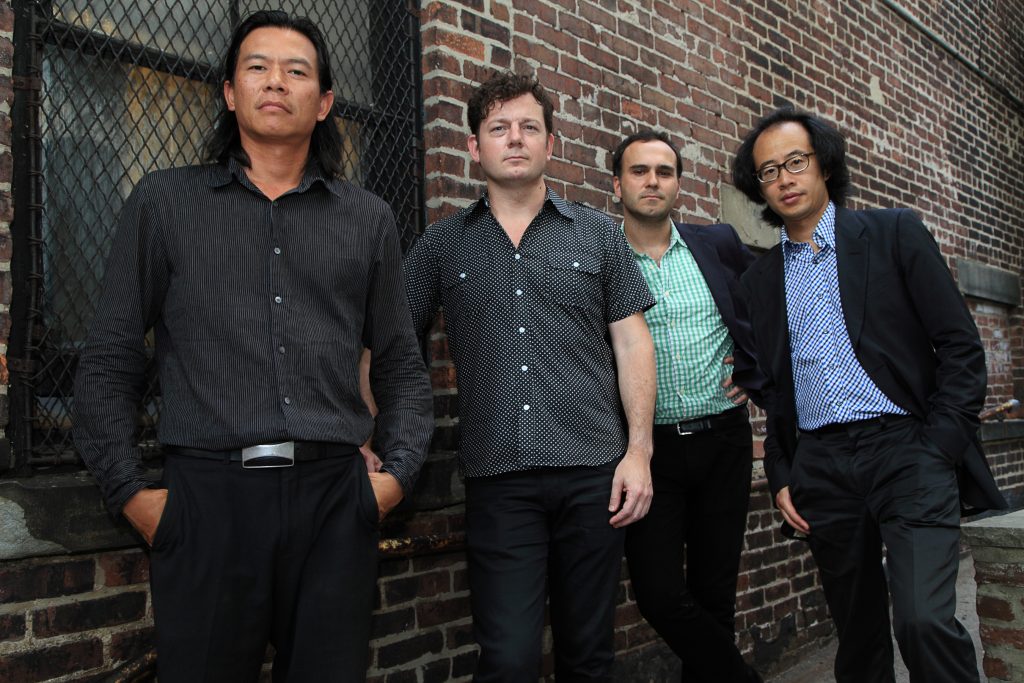The FLUX Quartet: SummerFest’s Powerful Champions of the Avant Garde
As a salute to the UC San Diego Department of Music, SummerFest’s host for most of the 2018 music festival’s concerts, Music Director Cho-Liang Lin featured two of the university’s resident composers in his festival’s annual program of contemporary music. Rand Steiger’s new work “Tropes” and Lei Liang’s 2005 “Serashi Fragments” communicated that austere, under-the-microscope, post-serial intensity that UC San Diego composers have championed ever since Bernard Rands left for Harvard and Roger Reynolds ascended the compositional throne in the 1980s.

FLUX Quartet: Felix Fan, Conrad Harris, Max Mandel & Tom Chiu (from left) [photo courtesy of the artists]
FLUX opened with Conlon Nancarrow’s 1987 String Quartet No. 3, with its brilliantly calibrated assault of aggressive canons that crackle in their dizzying overlap. His bracing, angular canons that began on effusive trills certainly demanded attention.
Nancarrow preferred to compose for player piano, an idiom that allowed him to deploy astounding rhythmic and structural complexities with pinpoint accuracy. When persuaded to write for live performance, he modified his demands only slightly, and FLUX handled his challenges with aplomb. I particularly appreciated first violinist Tom Chiu’s pristine pianissimo notes in the rarefied middle movement of the quartet. At that moment, the Conrad Prebys Concert Hall became surreally quiet.
In Liang’s “Serashi Fragments,” moments of hushed serenity were slashed with short, explosive themes that quickly retreated into gauzy clusters, whispers, scrapes, and muted melismas. His title links his eight-minute piece with a Mongolian traditional musician, Serashi, whose performance style on the two-stringed Mongolian fiddle—the chaorer—the piece alludes to but, at least according to Liang’s program notes, does not imitate. To those of us raised on the string quartets of Beethoven and Bartók but have never experienced the rich chaorer repertory, we will have to take Liang’s assertion on faith.
How strange that this program’s oldest work, Earle Brown’s 1965 String Quartet, proved the least accessible. At least to this listener, who was aware of the contemporary music scene in 1965, although I did not frequent the Manhattan haunts where Brown and his circle practiced their unique music. Before FLUX Quartet began Brown’s work, second violinist Conrad Harris explained that because of the level of indeterminacy Brown placed in his score, ten performances by FLUX of the work would each sound different.
At the opening of String Quartet, a quiet, dissonant chord slowly comes into focus, followed by a bee-like swarm of high pizzicatos more percussive than pitch revealing. Compact themes pop out of silence, like the magical appearance of fireflies on a Midwestern summer evening, and dense clusters fade in and out of quiet focus. As a memory, it all seems quite lovely, but in real time it seemed unsettlingly amorphous.
Oliver Lake’s “Hey Now Hey” actually sported a lyrical cello theme, but then Lake was a jazz saxophonist, so we don’t expect 12-tone rows and retrograde canons at the ninth from the likes of him. In his short essay for string quartet, the upper strings jostle above the cello, dispersing stray swoops that end in lubricious trills or pizzicato flourishes and rhythmic taps on the body of each instrument.
FLUX Quartet commissioned Steiger’s “Tropes,” a work inspired by the different ways Jews from different parts of Europe gave musical form to the musical markings (called tropes) over the Hebrew text in the sacred scrolls used in synagogue worship. Steiger had the quartet leave its position stage center, each member of the quartet taking a position in a different corner around the edge of the audience: string quartet surround sound. Themes emerged very slowly out of fervid oscillations, a kind of lyrical davening. The warm, generous sonority of the FLUX players gave “Tropes” its appropriate sacred fervor.
This concert was presented by the La Jolla Music Society in the UC San Diego Department of Music’s Conrad Prebys Concert Hall on Thursday, August 9, 2018. The La Jolla SummerFest continues in various San Diego venues through August 24, 2018.

Ken Herman, a classically trained pianist and organist, has covered music for the San Diego Union, the Los Angeles Times’ San Diego Edition, and for sandiego.com. He has won numerous awards, including first place for Live Performance and Opera Reviews in the 2017, the 2018, and the 2019 Excellence in Journalism Awards competition held by the San Diego Press Club. A Chicago native, he came to San Diego to pursue a graduate degree and stayed.Read more…


